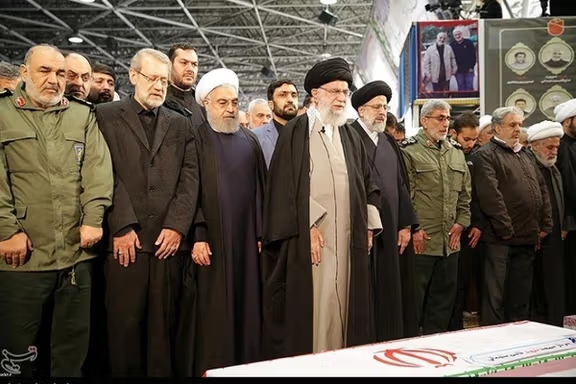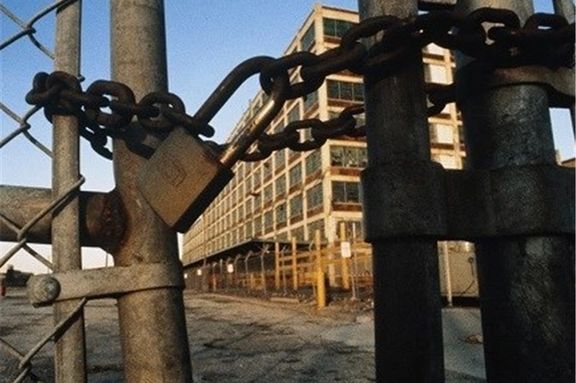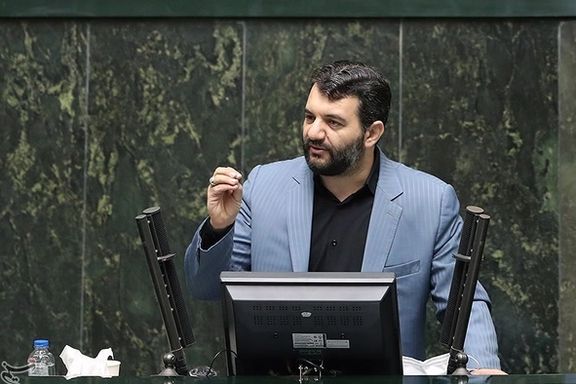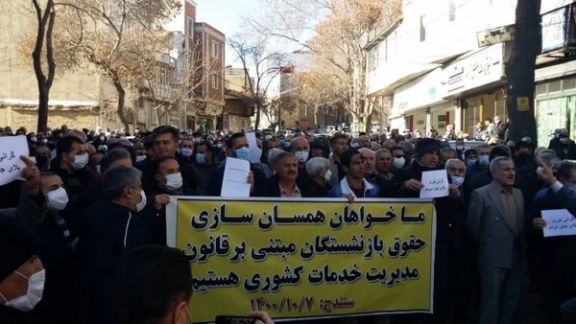Iran Says Soleimani's Killers Must Be Brought To Justice

Iran says Qasem Soleimani was assassinated with the direct order of former US president Donald Trump, vowing to bring the perpetrators to justice.

Iran says Qasem Soleimani was assassinated with the direct order of former US president Donald Trump, vowing to bring the perpetrators to justice.
Iran’s Foreign Ministry said in a tweet on Wednesdaythat the killing of the IRGC’s Qods (Quds) force commander was an epitome of “state terrorism”.
As the country is getting ready to hold ceremonies for the second anniversary of Soleimani’s killing threats and rhetoric by Iranian officials have increased. Iran Is planning a long list of events lasting ten days to mark Soleimani’s “martyrdom”. He was killed by a US drone strike on January 3, 2020, as he arrived in Baghdad.
Last week, the head of Iran’s Judiciary, Gholamhossein Mohseni-Ejei, renewed vows to avenge Soleimani’s killing, saying that it will definitely happen, and it will be harsh.
A lot of high-ranking Iranian military personnel and political figures, including Iran’s Supreme Leader Ali Khamenei, have promised revenge for the Soleimani's targeted killing.
“They must know that whenever possible, at the appropriate time, they must face revenge”, Khamenei said some two weeks before the first anniversary of his killing.
Iran has listed a host of US and Israeli officials as responsible for carrying out the attack.

Israel is considering several scenarios for an attack on Iran, with its military saying it can act immediately if it received the go ahead from the government.
According to Haaretz on Wednesday, Israel has allocated an extra $2.9 billion to its military budget for the sole purpose of attacking the Islamic Republic.
Military intelligence and more advanced cyber security systems for a more effective list of targets, as well as acquiring new weapons and conducting air force exercises are some measures to better prepare for a possible attack on Iran.
Chief of Staff Lt. Gen. Aviv Kochavi has said that “The IDF’s ability to maneuver has improved considerably, built on our ability to transfer quality intelligence to troops, increasing the number of armaments and personnel...”
In a document presented to the political leadership, the Israeli military has prepared several scenarios with different targets, but it stresses that it is not easy to assess how Tehran would react or to predict the outcome of the attacks on Iran’s nuclear program.
In their scenarios, Israel is also getting ready to fight Hezbollah in Lebanon and Hamas in the Gaza Strip as consequences of the attack on Iran.
Israel is also spending nearly $300 million to build a fence along the Lebanese border that will include high-tech military equipment able to thwart any attempt to breach it.
For the potential threats from the Gaza strip, the military has taken another approach. It said that the current relative calm between Israel and Gaza is mainly the result of transferring civilian aid to people of the enclave, adding that the IDF intends to allow even more goods to enter the coastal strip in the coming year.
The IDF has also expanded it talks with Hamas on exchanging prisoners and returning the bodies of Israeli soldiers that are been held by the group.
Tuesday night, Israeli Defense Minister Benny Gantz hosted Palestinian Authority President Mahmoud Abbas at his home in Rosh Ha’ayin, probably to discuss the Palestinians’ possible response following an attack on Iran.
Israel is also increasing its military cooperation with Egypt, Jordan, Cyprus, Greece and some Persian Gulf countries that could guaranty greater legitimacy for an attack to stop Iran from building a nuclear bomb and contain its support for the militant groups in the region. According to IDF estimates presented to the government, Iran can build a nuclear bomb in about two years.
To counter Iran’s growing arsenal of ballistic missiles, Israel has also signed several contracts in the past year to improve its air defense system, already one of the best in the world.
The Israeli military has also boosted the level of its attacks on Iran’s shipments of munitions to its proxy forces, with the IDF claiming that it stopped about 70 percent of the flow of arms from Iran, Syria, and Iraq into Lebanon.
The attacks have probably hindered Iran’s transfer of complex weaponry to its supporters because now Tehran must make the shipments very smaller, sometimes so small that can be transferred by civilian airline flights.
During its recent massive military drills, Iran simulated an attack against Israel's Dimona nuclear reactor, which included launching 16 ballistic missiles and five suicide drones.
The Iranian military has said the wargames carried a stark warning to “threats made by the Zionist regime’s officials” while some in Iran believe they were meant to give bargaining power to Iran’s nuclear negotiators in Vienna.
Rhetoric has intensified between Iran and Israel in recent weeks as nuclear talks between Tehran and world powers have resumed in Vienna. Israel has vowed that if Iran's nuclear program reaches a stage close to production of weapons, it will act regardless of an agreement between world powers and Tehran.

Iran’s deputy minister for industry and trade has said that bank seizures of companies and factories has increased this year, amid a deepening economic crisis.
Mehdi Niyazi told local media that from April to September 1,793 industrial and trading companies were seized by banks after they failed to make loan payments. Most banks in Iran are fully or partly state owned.
Niyazi added that over 60 percent of companies in Iran have financial problems because of high inflation, estimated to be close to 50 percent and lack of finance.
He explained that many companies after seizure of ownership by banks stopped operations, a situation that would increase an already high unemployment rate. One bank that just last year had 60 companies under its receivership now has ownership of 160 firms.
The deputy minister partly blamed high interest rates the banks charge for the insolvency of companies struggling amid sanctions and an economic crisis.
Iran’s weak economy took a turn for worse in 2018 when the United States withdrew from the 2015 nuclear agreement and imposed tough sanctions on the country.

Dangerous levels of air pollution in Esfahan, Tabriz and more than a dozen other major Iranian cities have shut down schools and kindergartens.
According to Iran’s air quality control center, the air pollution indicator in several other cities, such as Tehran and Mashhad, has crossed the danger line for sensitive groups, but the authorities have not yet decided to close down schools in these cities.
Abed Maleki, a deputy governor for Tehran’s civil affairs coordination, said schools in the capital are not closed because the air pollution index in the city is still below 150, a level which makes it unhealthy for everyone.
However, he urged citizens, especially children and the elderly, to stay home until pollution levels decrease.
According to Ruhollah Motafker Azad, the representative of Tabriz in the parliament, the reason for the high concentration of air pollutants in Tabriz is burning mazut, a dirty fuel, instead of natural gas in its thermal power plant.
Mazut -- commonly called waste oil -- is a heavy, low quality fuel oil, only used when the facilities to blend or break it down into more conventional petro-chemicals such as diesel are not available.
Iran has the world's second largest natural gas reserves but becuae of lack of investments and technology, production is declining.

Iran’s labor minister has described unemployment as the main problem of the country, second only to inflation, but said it is not the ministry’s task to create jobs.
Hojatollah Abdolmaleki made the remarks before the Iranian parliament on Tuesday, stressing that his ministry is only responsible for coordination among other ministries and departments are tasked with dealing with unemployment.
He noted that the current administration took over the government at a time when about 14 million people did not have decent jobs, while 2.5 million people were completely unemployed.
The minister, the youngest in the cabinet, added that according to plans about 1,850,000 jobs will be created in the country in the next 18 months, an average of over 100,000 jobs per month.
According to him, about 217,000 jobs have been created during the last three months. He did not explain how so many jobs can be created amid a serious economic crisis worsened by US sanctions.
There are numerous figures about Iran’s unemployment rate, ranging from the IMF which put it at about 11 percent to other sources who report it to be over 20 percent.
Part of the huge difference in numbers might be due to the government’s definition of employment. The Islamic Republic considers anyone who works for one hour a week, as employed, which means that the government greatly overestimated the number of truly employed people.

Iranian retirees held demonstrations in the capital Tehran and several other cities to protest their low pensions that have left them at the verge of poverty.
In the Tuesday rallies, the pensioners in Tehran gathered in outside the parliament while people in other cities held their protests at the provincial offices of the Civil Servants Pension Organization.
“Stand up and fight discrimination”, read some of the banners they carried during the rallies, while they were also chanting slogans against “incompetent authorities”, asking for their resignation.
The protesters demand higher pensions on par with the country’s inflation rate and rising costs of living. The annual inflation rate has hovered around 45 percent in recent months.
They called on the country’s authorities to accelerate efforts and approve laws that can potentially improve their pensions.
A bill to address the pensioners’ demands has been languishing in the parliament for months.
Iran, which is hit hard by economic sanctions, is the scene of frequent labor protests and strikes.
Hundreds of striking and protesting workers and labor activists have been arrested since 2017, many spending months in prison. Some are still detained without trial.